From parkour for seniors to stylish adult diapers, Singapore youths are revitalising the business of eldercare
Fresh ideas, big hearts. From transport to fitness and design, a new generation is reshaping the business of eldercare with empathy and innovation.
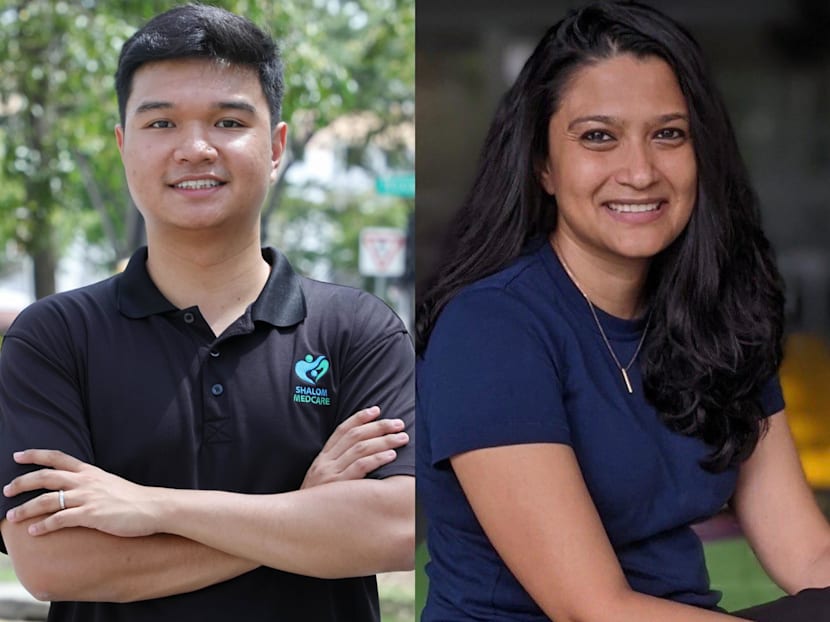
Mr Javier Chan is the director at Shalom Medcare and Ms Nivedita Venkateish is behind the adult diaper brand Aire. (Photo: CNA/Alyssa Tan, Aire)

This audio is generated by an AI tool.
When Mr Javier Chan's friends and peers first heard about his plans to start a medical transport service for seniors and patients in 2021, they praised it as a smart move.
After all, given Singapore's rapidly ageing population, the silver economy was booming. He would definitely be in the "correct industry", they declared.
But once Mr Chan, then 23 and fresh out of national service, began running Shalom Medcare, he quickly discovered that eldercare was far more complex than the average business.
Mr Chan is no stranger to transport and logistics: His family has run a private bus charter business for decades.
Retrofitting the same transport vehicles to be wheelchair-friendly was a challenge he took on with ease. So was keeping track of changing schedules as well as multiple vehicles and drivers.
What he hadn't expected, however, were the many challenges of navigating his chosen clientele's complex emotional needs and struggles.
His passengers were often frail, in pain or exhausted from dialysis, rehab and other medical treatments, and their moods could swing from gratitude to frustration within minutes.
"Instead of just providing transport, I found myself in a situation where I need to learn how to properly handle people's emotions," said Mr Chan.
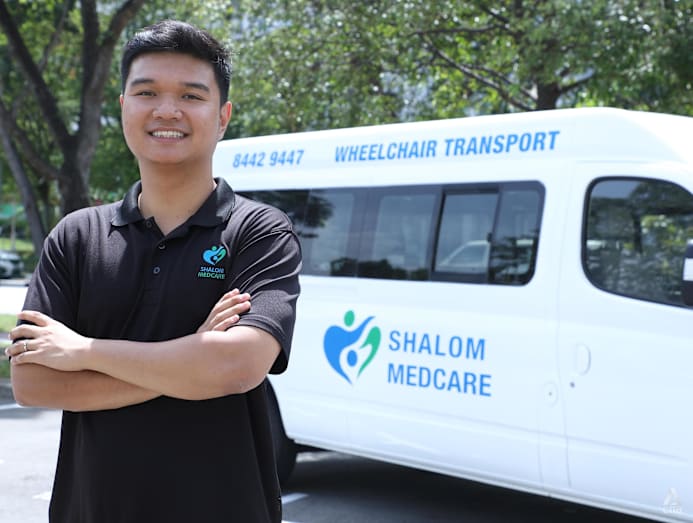
It was a steep learning curve for someone still in his early twenties, especially one with limited experience dealing with seniors and patients.
"In this line, profit always comes second. What matters most is making sure (we) serve society and truly add value to our clients."
He is part of a growing group of young Singaporeans who are entering the eldercare industry, motivated not just by economic opportunity but empathetic purpose – and quickly finding their ideas of care reshaped and reformed.
YOUNG BLOOD IN SILVER WATERS
In the Asia Pacific region, the silver economy is forecast to be worth S$6.2 trillion (US$4.6 trillion) by the end of 2025, with a projected 7 per cent compound annual growth rate up to 2032, said business consultancy Ageing Asia in 2020.
And Singapore ranks top of the list with the greatest potential in terms of its ageing population's capacity to spend or be supported by their children in spending on services and products focused on managing the ageing.
The country's 2025 Population in Brief reported that the proportion of the citizen population aged 65 years and above is rising at a faster pace compared to the last decade.
As at June 2025, those aged 65 and above made up 20.7 per cent of the citizen population, compared with 13.1 per cent a decade ago.
The number of citizens aged 80 and above has also gone up about 60 per cent, from 91,000 in 2015 to 145,000 in 2025.
The report is published by the National Population and Talent Division of the Prime Minister's Office and its partner agencies.
Singapore is projected to attain super aged status by 2026, when more than one in five citizens will be 65 years old or older. By 2030, one in four Singaporeans will be aged 65 or above.
Against this backdrop, more young entrepreneurs are finding their paths in a sector once considered the domain of doctors, nurses and social workers.
For Ms Nivedita Venkateish, 36, inspiration struck while watching her mother struggle to find decent adult diapers for her grandmother.
"The products she was looking through were so dated. They looked like something from the 70s," said the former senior manager at Kraft Heinz.
"The material was rough, they leaked, and the brands hadn't evolved with their customers."
In 2023, she started Aire, a business that recasts adult diapers as lifestyle products, introducing an aesthetic aspect to items that have typically been seen only as medical necessities.
For Ms Venkateish, the goal was to pair design and comfort with dignity and respect. "Being over 65 doesn't change the fact that you're a consumer," she said.
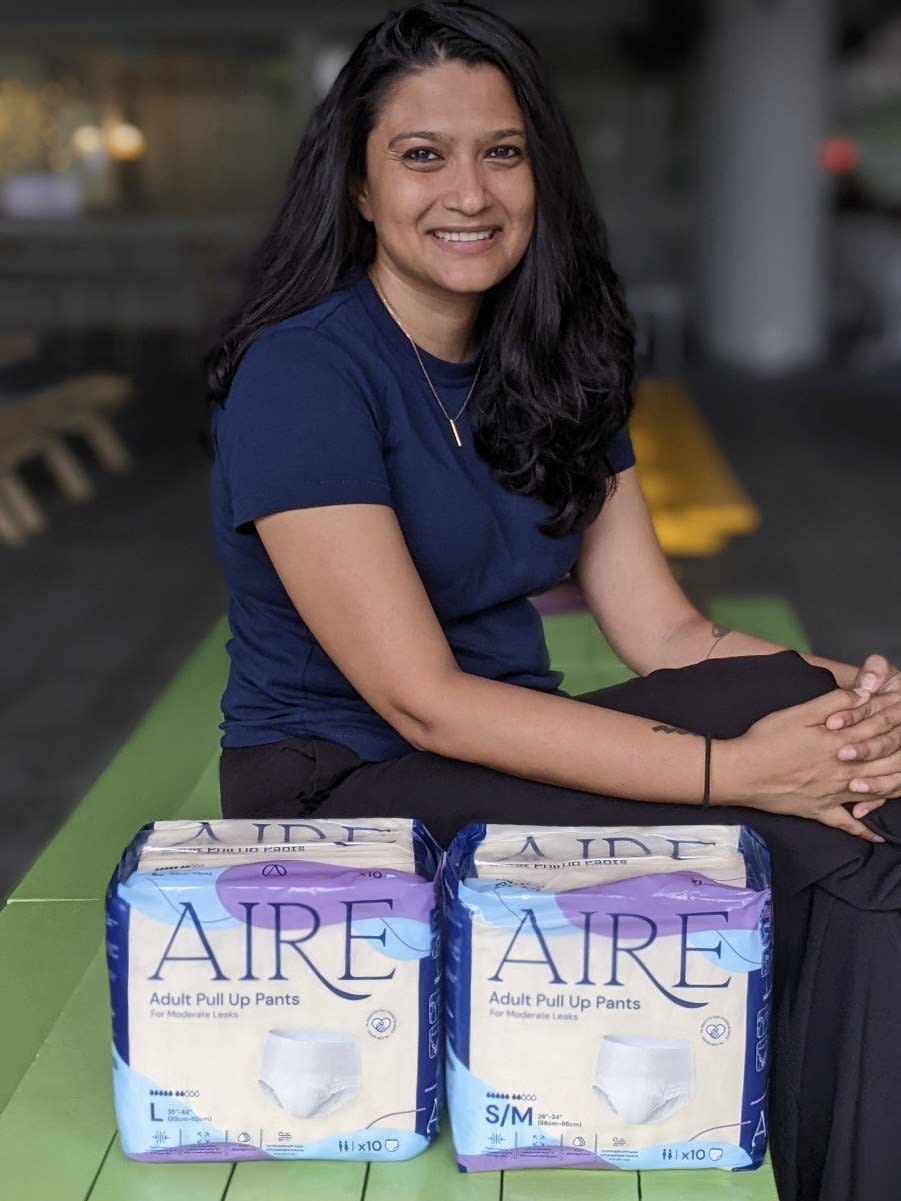
Others, like Mr Tan Shie Boon, are setting out to get seniors moving.
Since 2015, the 33-year-old has been coaching parkour, a sport that involves moving swiftly through spaces by running, jumping and climbing over obstacles.
He worked mainly with children, youths and young adults, until a chance encounter in 2017 with a 64-year-old woman who wanted to try parkour to improve her balance.
Coaching her opened Mr Tan's eyes to how parkour could help older adults improve and build confidence in their mobility.
He founded Movement Singapore in 2022 to focus exclusively on seniors, adapting the sport into low-impact drills that train balance, coordination and fall prevention.
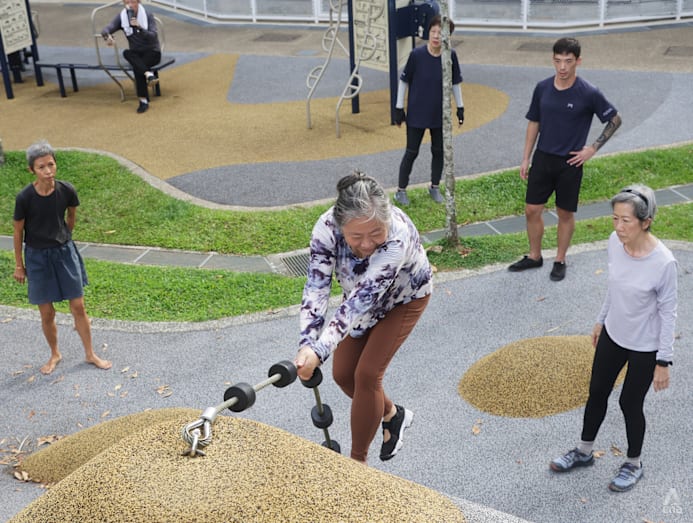
Early in Mr Benson Poh's career as a personal trainer, he started working with a female client in her fifties.
Initially, he was disappointed when they failed to meet her personal weight loss goals – but to Mr Poh's surprise, she told him the training had transformed her life nonetheless.
She was now able to climb stairs without pain, carry bags of groceries without needing frequent breaks and even run after her grandchildren. She told him that she no longer felt like a burden to her family after regaining mobility through training.
"It changed my perspective on things," said Mr Poh, 35.
He went on to start Vigeo Personal Training, a gym that primarily caters to clients aged 50 to 80. However, he noted that there is "very little high-quality senior training" currently available in the mainstream fitness industry.
As such, he and his team of four coaches have to work doubly hard to develop their own internal methods for training and tailor them for each client according to their goals, medical conditions, and strength and mobility.
One of Mr Poh's clients, a woman in her seventies recovering from cancer and severe osteoporosis, could barely bend without pain when she first arrived. After two years of training, she was strong enough to catch her nine-year-old grandson when he leapt into her arms.
Another client, a knee replacement patient who was struggling to simply stand up, cried when she finally rose from the floor unaided, something she thought she'd never do again.
"Fitness has always been seen as something for the young," he said. "But it matters more to the people who are older – it changes their quality of life."
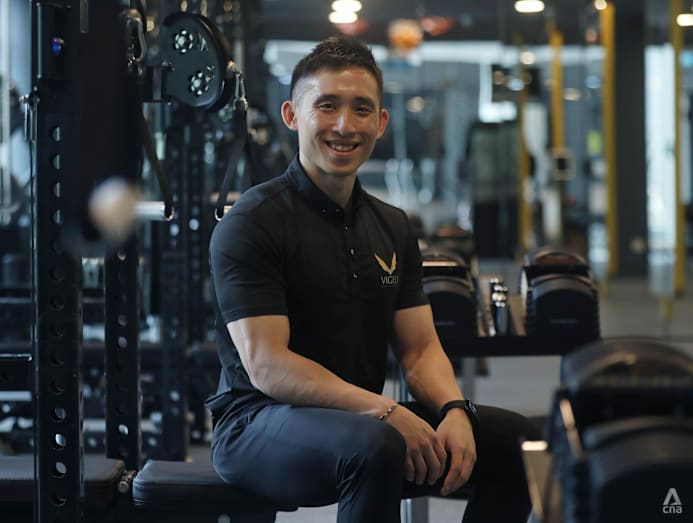
Even students are joining the fray.
Rehabify is a new app that transforms physical exercises into interactive, game-like experiences. It's unique for the way it gamifies exercise for seniors, but also because the founders behind it are three Singapore Polytechnic students: Mr Lim Jian Ping, 20; Mr Rafael Macam, 22; and Mr Reyes Ng, 19.
Mr Ng's personal interest in eldercare was sparked by his volunteer work with the Singapore Red Cross, where he serves as an engagement coordinator.
His experiences led the group to a realisation: that for seniors, care and physiotherapy can be "very boring", said Mr Lim.
The group observed that seniors were often told to watch dry instructional videos on how to exercise, which did not inspire much motivation or enthusiasm on their parts.
Mr Lim began tinkering with computer vision and artificial intelligence tools to recognise and interpret human movements through a camera. Eventually, the group created control games that allowed players to make moves using their bodies instead of controllers.
Gamifying exercise and rehab for seniors isn't just about helping them to have fun, said Mr Lim, but also to build consistency in physical movement.
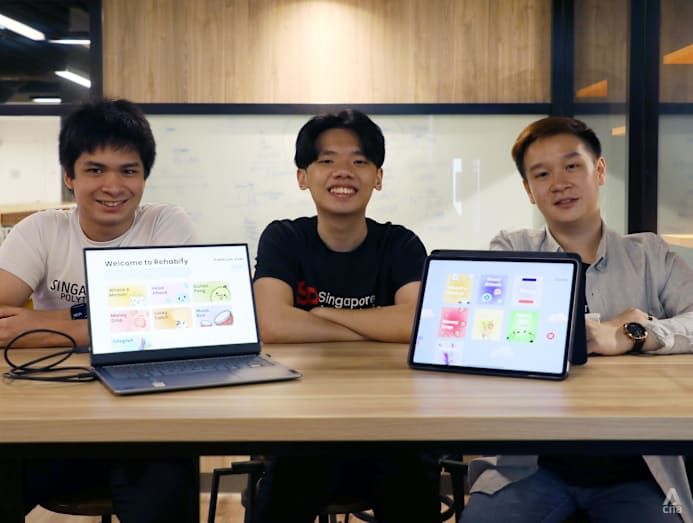
THE EMOTIONAL AND PSYCHOLOGICAL TOLL OF AGEING
Despite their motivation, many of these youths soon discover that the business of eldercare is not for the faint of heart.
Mr Chan of Shalom Medcare said that for his team of 21 drivers, every pick-up and drop-off involves numerous considerations beyond traffic conditions.
Before every trip, his team goes over details the average passenger likely never thinks about – for instance, slopes or inclines for wheelchair-bound clients, and whether a client is wearing covered shoes before boarding their vehicles.
For diabetic patients, even a small knock or scrape against a wall or door can be dangerous. Slow healing can lead to infection or, in severe cases, amputation.
Even more challenging: learning to deal with old or sick clients who can be irritable or particularly difficult.
Mr Chan noted that his clients' medical conditions can heavily affect their mood, with some feeling dizzy, nauseous or just extremely drained pre- or post-dialysis – and it's not uncommon for this to result in unsavoury incidents.
One client, upset over a late pickup, hurled a curry puff at one of Mr Chan's drivers – the same curry puff the driver had bought for the client on his way over.
Nevertheless, Mr Chan tries to go the extra mile even when patients are difficult, knowing their frustration often masks something deeper.
Once, just a year into running the business, he arrived to pick up a dialysis patient who refused to leave the house.
Mr Chan didn't press; he thought the man just needed rest. Hours later, the police called to tell him the patient had passed away. Mr Chan was the last person to see him alive.
It's been years, but Mr Chan still finds himself wracked with regret. "Maybe if I had tried even harder, I could have saved someone’s life," he said.
Now, he spends more time and effort on patients who hesitate or refuse transport, asking them what's wrong, listening and gently persuading them to go for treatments.
Most eventually acquiesce once they feel heard, he added.
Over at Vigeo Personal Training, Mr Poh spends as much time calming fears as he does teaching form. Many of his clients start extremely hesitant, wary of injury or convinced they're too old to start exercising.
For many clients, simply stepping into a gym at their advanced age can feel intimidating.
"They see these machines and hear horror stories. They see (other) people who are so fit and know what they're doing, and they feel out of place," said Mr Poh.
He tries to debunk their misconceptions early on, rather than strong-arm them into working out. "If you've had a knee replacement or a fall, that's even more reason to exercise, not less."
Similarly, Mr Tan’s biggest challenge is convincing seniors that parkour can be safe when practised properly.
To ease their fears, he teaches risk management, including how to land and break a fall.
He focuses on building "progress through baby steps", an approach that has even enabled him to teach parkour to a senior in a wheelchair living with Parkinson’s disease.
It's a philosophy shared by Mr Poh, whose goal is to help clients see age as motivation rather than limitation. "We show them that if someone at 81 can do it, they can too."
Sometimes, seniors' fears and concerns about ageing extend beyond themselves.
In Aire's early days, founder Ms Venkateish found it particularly difficult to find people willing to talk openly about incontinence, given the stigma surrounding the issue.
She said that incontinence, which is the involuntary loss of bladder or bowel control, affects around 400 million people worldwide but, despite its prevalence, remains a "deeply personal" problem for many.
This taboo didn't just make it hard to market Aire products, but also test them in the development stages. "Even finding participants to take part was a challenge," she said.
"You have to build a lot of trust and credibility to even have an open conversation about … incontinence," she added – a tough ask for a brand new startup with no established presence.
She had to invest heavily in community engagement to normalise public conversations around incontinence, reaching seniors on TikTok, at active ageing centres and in-person events.
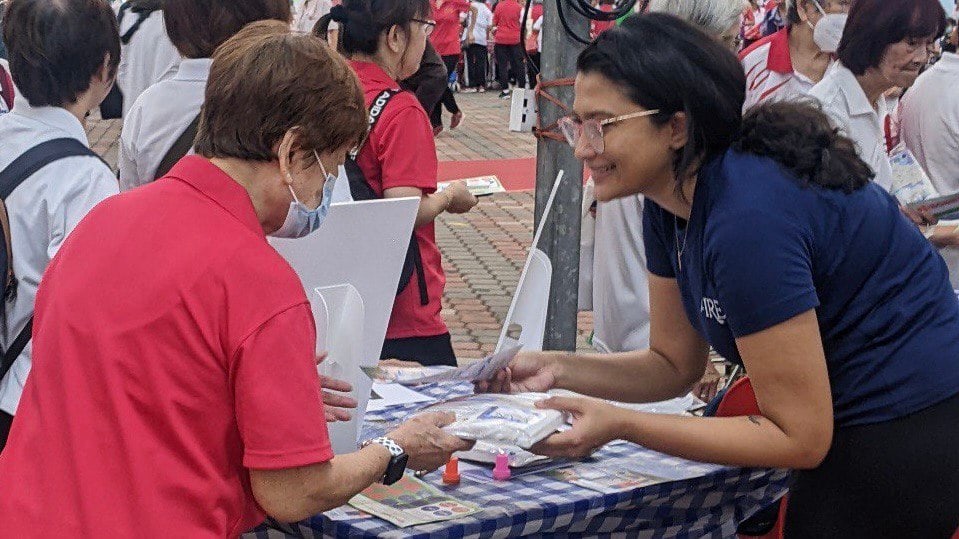
CAN ELDERCARE BE A YOUNG MAN'S GAME?
Associate Professor of Sociology Alwyn Lim from Singapore Management University said more young Singaporeans are likely to venture into eldercare, as many are increasingly health-conscious and aware of their own ageing.
"It aligns with their own values and what they see happening in society," he said.
As such, for many youths forging a path in eldercare, it's no longer just about medical treatment. Instead, it's about empathy, innovation and the simple belief that anyone can make a difference if they care to try.
The real challenge for the young Rehabify team wasn't grappling with the coding and technology behind their app, but understanding what seniors actually wanted.
After testing the initial version of the app at Active Ageing Centres, they began involving the seniors in the process of refining the game's design.
With the seniors' input, the team added in various elements: exercises based on the traditional game of capteh, animated icons such as money bags and lively music.
"What we really want to do is (enable seniors) to enjoy their golden years," said Rehabify's Mr Macam.
Principal research scientist Dr Ad Maulod from the Centre for Ageing Research NS Education at Duke-NUS said it is crucial to avoid seeing seniors as monolithic.
One cannot assume all seniors would respond to the same thing, he emphasised. Interactions with seniors are key to leading those in eldercare to more empathetic solutions – as the Rehabify team did.
Though the students are still decades away from their own twilight years, working closely with seniors on Rehabify has reshaped how they see ageing.
"I hope that something like (our app) will exist when we (ourselves) grow old," said Mr Ng.
"I hope that something like (our app) will exist when we (ourselves) grow old," says Rehabify's Reyes Ng.
For Mr Poh, helping seniors achieve what they thought was impossible for them has served as a blueprint for his own golden years.
"It showed me you don't have to be afraid of getting old, so long as you know how to take care of yourself. It's about health span, not lifespan," he said.
"That gives me a lot of comfort, knowing that when I'm in my 50s, 60s or even 70s, I can still travel and be fit and healthy."
Ms Venkateish of Aire noted the growing number of seniors travelling regularly or using new technology and digital platforms to explore new hobbies.
For instance, YouGov data shows that in the US alone, those aged 55 and above made up just 9 per cent of TikTok's weekly users in 2022. By 2024, that proportion swelled to 14 per cent.
Ms Venkateish's interactions with seniors for her business have overturned her own understanding of old age as a "wind-down".
"When I see how busy and content many of them are, it actually makes me look forward to ageing."
Additional reporting by Deborah Lau.














